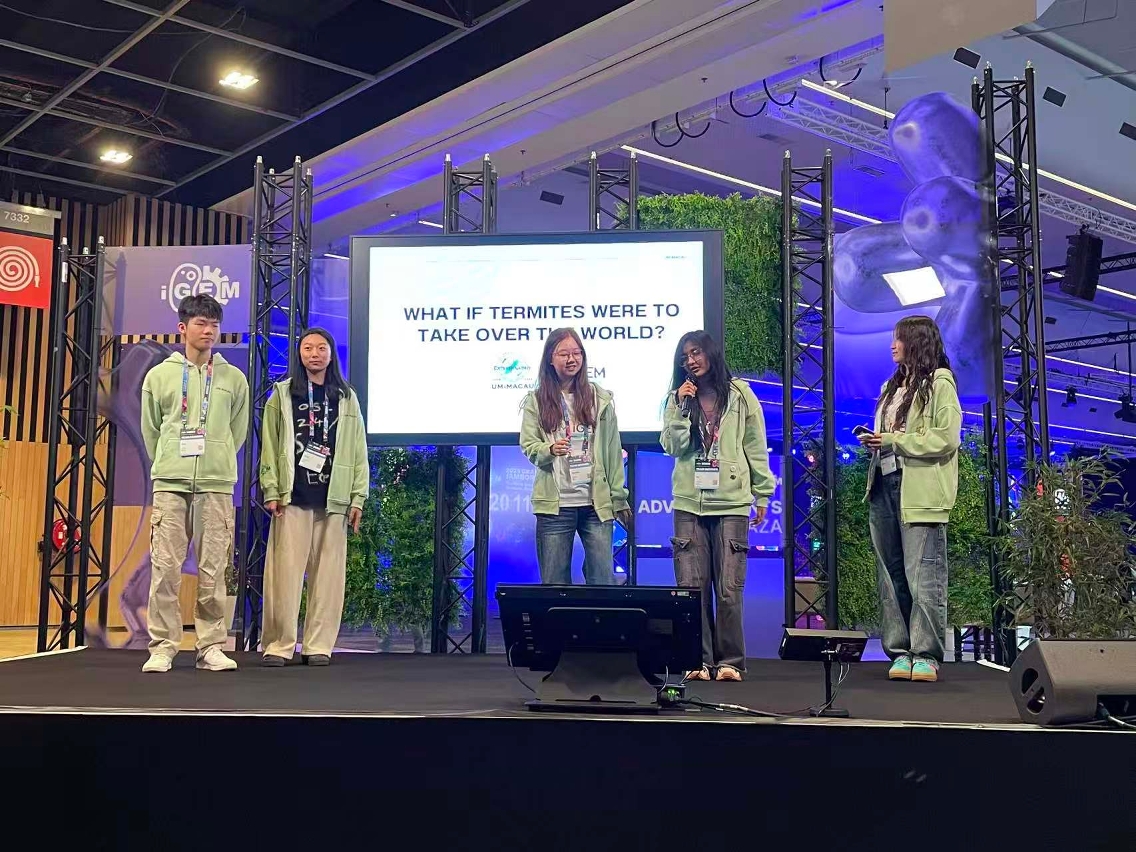 The UM team gives a presentation
The UM team gives a presentation
A team of undergraduate students from the Faculty of Health Sciences (FHS) at the University of Macau (UM) has won a gold medal at the 2025 International Genetically Engineered Machine (iGEM) Competition held in Paris. Their award-winning project focuses on an innovative synthetic biology solution for termite control. This is the seventh consecutive year that UM has won an award at iGEM, bringing the total number of gold medals to four.
This year’s competition attracted over 400 teams from more than 50 countries and regions, including teams from renowned institutions such as the Massachusetts Institute of Technology (MIT), Harvard University, and Tsinghua University. The UM team comprised 13 undergraduate students in FHS and was guided by FHS Professor Garry Wong, Associate Professors Leo Lee Tsz On and Liu Tzu-Ming, as well as Assistant Professors Chen Qihan and Lei Chon Lok. In response to the growing issue of termite infestation, the team proposed an innovative control solution that is highly effective, eco-friendly, and sustainable.
Termites feed on cellulose and pose a threat to wooden structures, and the issue of termite infestation is exacerbated by global warming. Although existing termite control methods are effective, they are limited by issues such as environmental pollution and high costs. The UM team used synthetic biology techniques to engineer E. coli to produce natural toxins and attractants. They then combined these with enhancers to formulate a highly effective, eco-friendly termite pesticide. The natural toxins include EcTI, a plant-derived trypsin inhibitor that disrupts termite digestion, and melittin, a peptide found in bee venom that damages the termite’s gut microbes. Meanwhile, the attractant hydroquinone stimulates termite feeding behaviour to increase bait intake. The team also developed two application models: an underground solid bait station for long-term colony eradication, and a liquid injector for immediate treatment. Mathematical models were used to optimise bait placement strategies and simulate toxin transmission within termite colonies, thereby enhancing control efficiency.
The UM team members dedicated their spare time to project design and experimentation, as well as conducting field visits in various places to gain a deeper understanding of termite ecology and the application of control measures. By exchanging ideas with industry practitioners and scholars, the team refined their experimental design and gained practical insights into field trapping techniques, thereby enhancing the project’s feasibility and potential applications. With guidance from experts, the team clarified the innovative aspects of their solution, making it more scientifically rigorous. Team leader Wang Ying, a third-year student in FHS, said that although the process was filled with many unprecedented challenges, the rewards were plentiful. They had not only enhanced their professional knowledge but also developed soft skills such as communication and teamwork.
Founded by MIT in 2003, iGEM encourages participants to use synthetic biology to address real-world problems. It has since become one of the world’s most prestigious student competitions in biotechnology.



